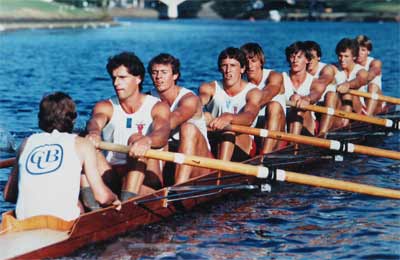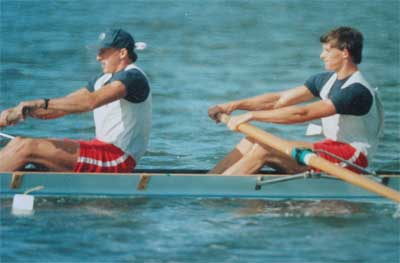History of Mercantile Rowing Club
Table of Contents
Chapters
- The River Yarra
- Early Rowing in Victoria
- The Beginnings (1880-1890)
- Mercantile in the Nineties (1890-1900)
- Sloan, Ivens and Fluctuating Fortunes (1900-1910)
- Dark Days and New Dawn (1910-1920)
- Years of Mixed Success (1920-1930)
- Through the Thirties (1930-1939)
- The Struggle for Survival (1939-1946)
- Building for Success (1946-1950)
- Mercantile to the Melbourne Olympics (1950-1956)
- Rowing to Rome (1956-1960)
- A Pink Cloud on the Horizon (1960-1965)
- The Storm and its Passing (1965-1966)
- A Clear Light Blue Sky (1966-1968)
- High Noon (1968-1970)
- A New Challenge (1970-1973)
- Fire and the Second Building Project (1973)
- Winds of Change (1973-1976)
- The Close of the Century (1976-1980)
- The Base for Success (1980-1984)
- Success (1984-1988)
- Oarsome Foursome (1988-1992)
- A Boathouse for the Best (1992-1996)
- The Rise of the Professional Coach (1996-2000)
- Golden Girls (2000-2005)
Appendices
21. The Base for Success (1980-84)
Chapter Twenty-One page 1 2 3 4 5
1981-82 season
Towards the end of 1981, Mercantile was proactive in recruiting on all levels of rowing particularly in the area of school leavers. It is significant to note that out of the ten APS rowing schools at the time, eight of the school rowing programs were heavily influenced by Mercantile members. MUBC still remained our most obvious nemesis in terms of the recruitment of school leavers, where University college and intervarsity rowing were still big ticket items on the Victorian rowing scene.
Mercantile also maintained a strong presence in the traditional encouragement of novice rowing during this period. This was managed and coached by Victor Ronai-Horvath with the assistance of Lindsay Wallis. Lindsay's main role was club equipment manager and basically kept many crews on the water with his attention to detail during a period when the demand on boats was increasing more and more with every season.
The local regattas held prior to Christmas 1981 featured many Mercantile wins in the club junior categories. The youth squad was mainly lightweight, but showed the potential which would make them very competitive in years to come in the tough arena of Victorian and national lightweight rowing.
In November of 1981, a cricket match was organised between the heavyweight and lightweight men's rowing squads. This wasn't so much an attempt at inventive cross training but a good excuse for a different social event. Many participants were somewhat confused with their cricket after first visiting the Sunday barrell at the Mercantile clubrooms. A highlight of this match was the then current club secretary, David Pincus, opening the batting for the heavyweights. He was given out three times but still remained at the crease, stating that the umpire, Tim Frederico (being a Collingwood Football Club supporter), was incapable of making rational decisions. The after party was held at house in suburban Glen Iris recently purchased by Marty Owen and leased to 3 very infamous rowers. It was known as "Karana Towers". During the post cricket match festivities and debate (no one was sure who had actually won the game), Marty mentioned that some sections of the house were in need of renovation. These sections of the building were immediately demolished by excited and confused Mercantile rowers.
In a successful season with over seventy victories and marked by many notable achievements, one of the highlights were undoubtedly the win by our senior eight in the State championships (the first since 1970) by one metre in a new record time for Ballarat of 5 mins 49.5 seconds, some five seconds better than the previous mark. All except Sabljak and Borger represented the State in the King's Cup.
The senior eight win was achieved with a relatively inexperienced crew which suffered injury setbacks (Jeff Lawrence replaced Ian Belot) plus the transfer of Sam Patten to the university squad. Only three members of the Mercantile eight; namely Ion Popa, David Doyle and Neil Myers, had any real senior rowing experience. As a consequence of this win, Mark Doyle, David Doyle, Stuart Moreton, Neil Myers, Ion Popa and Jeff Lawrence (reserve) were named in the Kings Cup boat. Mike Sim (cox) and Peter Philp (coach) were also selected for the Victorian crew.

1982 Senior Eight
Cox: Michael Sim, Str: Ion Popa, 7: Neil Myers, 6: Stuart Moreton, 5: David Doyle, 4: Mark Doyle, 3: John Sabljak, 2: Jeff Lawrence, Bow: Alan Borger
Whilst the Mercantile heavyweight men struggled to be competitive in the small boats at the National Championships with only Ion Popa being successful in a composite four win, it was hoped that the Kings Cup eight could issue a challenge. This was not to be, the crew was second at the 1,000 metre mark but faded to finish fourth behind South Australia, Tasmania and New South Wales.
The 1982 Victorian men's youth eight was dominated by Mercantile after an unbeaten season. Joe Joyce, Peter Howe, Martin O'Halloran, Tasso Paxinos, Greg Pechan and Doug Scown were selected with Grant Atkins and Gary Harris as reserves. Graham Barns (cox) and Mike Manley (coach) completed the team. Six members of this boat were true lightweights but they finished a close second behind a strong NSW crew, many of whom would go on the represent Australia in heavyweight world rowing a few years later.
Complementing this performance was the Mercantile win in the first national under 23 eight, with half of this crew being development lightweight rowers. Marty Owen successfully coached this boat at the nationals with rowers developed during the local regatta season by Phil Ainsworth, Alex Sloan, Tim Frederico, Paul McGann, Nick Newton and John Leeming. In fact three of the developing lightweights from Martin's boat, namely Derek Mollison, Alan Borger and Ian Rycroft, would feature as lightweight internationals over the next decade. Not a bad start for Martin to his coaching career.
Selection in the national teams was scarce with the only representatives being David and Mark Doyle as a coxless pair in the Match des Seniors (unoffical world under 23 championships) held in Vienna in August 1982. Mark and David won the gold medal and were the first gold medal by an Australian crew in this competition. The significance of this win is highlighted by the fact that the Doyles won their first race for Mercantile in 1980 (two years prior) in the maiden coxed pair whilst both brothers were still students at Melbourne's Xavier College. In the two years from school to international gold would become a familiar aspiration for many future Mercantilians.

1982 Australian Gold Medal winning Under 23 Pair
Str: David Doyle, Bow: Mark Doyle
